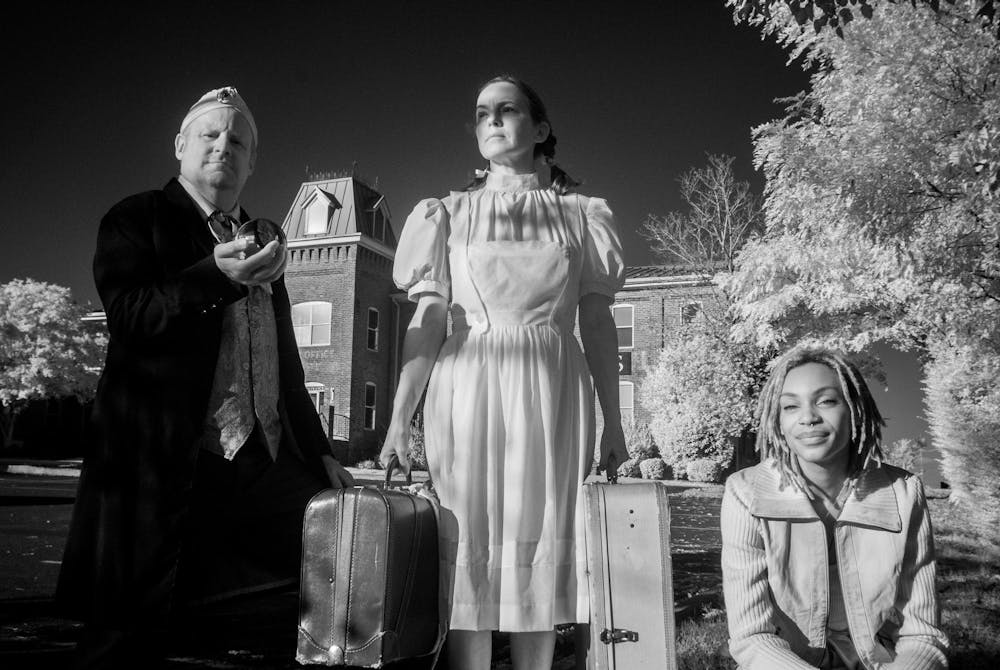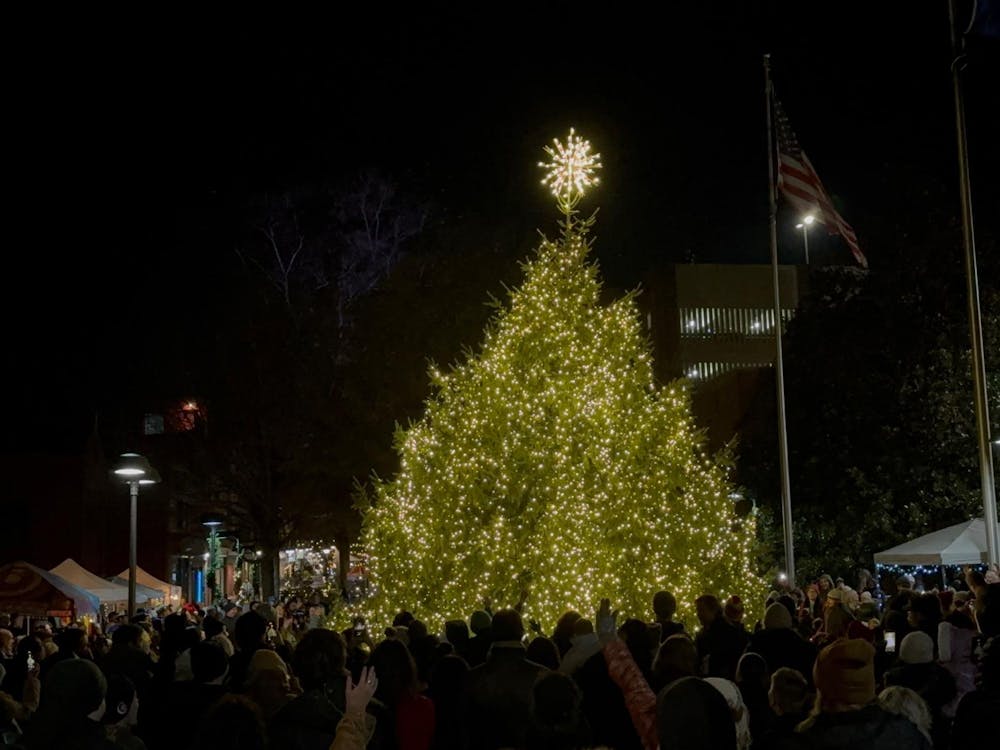“There’s no place like home,” Dorothy famously declares in the beloved musical “The Wizard of Oz.” For Dorothy, home is Kansas — but for others, like the members of Live Arts, home is something a bit less geographic and less tangible. Home is the theatre and the sense of belonging it offers. In their latest mainstage production, the artists at Live Arts craft a unique adaptation of L. Frank Baum’s “The Wizard of Oz” which highlights the empowerment offered by community and the importance of returning home — wherever that may be.
Live Arts is a community theatre organization that has been staging quality productions in downtown Charlottesville since 1989. The organization puts on plays and musicals, offers summer camps, classes, workshops and presents a yearly new works festival, showcasing original works by local playwrights. Per the organization’s mission statement, Live Arts believes in “forging community connections by engaging people in the creation of locally produced, volunteer-powered theater.”
The theatre’s programming is made up of seasons that consist of four to five mainstage plays and musicals, usually united around a common theme. According to the Live Arts website, the 2024-2025 season’s theme is “voyages,” and includes shows that “share a tingling feeling of adventure, stepping forward into the unknown future and back into the known past.”
Other productions that have wrapped up earlier this season include “The Iliad,” an adaptation of Homer’s epic, and “What the Constitution Means to Me,” a play in which a public speaker examines the U.S. Constitution. “The Wizard of Oz,” however, is the first musical of the season, and perhaps has the greatest name recognition of all of the shows — notably, Live Arts’s production has arrived right alongside “Wicked,” the film adaptation of the beloved Broadway musical based on the characters of Oz.
The community theatre’s imaginative production of “The Wizard of Oz” is a story of homecoming — Dorothy’s homecoming, of course, but equally that of former artistic director John Gibson, who returned to Live Arts for the first time since his 2010 departure to direct the show, adopting an approach to familiar source material unlike others in the past.
Will Luckett, who plays the Tin Man, noted Gibson’s transformative innovation, offering Live Arts audiences a new perspective on a show with many different iterations throughout different periods of history.
“The layers of telling this story are multiple,” Luckett said. “This production in particular is going to be different … it’s acknowledging the history and how [“The Wizard of Oz” exists] in the zeitgeist, the personal meaning of it. There's these sort of different frames in the way we're going to present it that might be different than folks have seen before.”
Leading the production alongside Gibson is “The Wizard of Oz” co-director Ray Nedzel, who said he has been involved with Live Arts for 22 years since moving to Charlottesville from Los Angeles. Similarly to Gibson, Nedzel said the sense of community he found as a cast member in Live Arts is what keeps him coming back to the organization.
“It made me feel like I could find an artistic home in Charlottesville,” Nedzel said. “It's a great place to make things and to do things.”
Nedzel acted as marketing director for Live Arts until the pandemic and now runs a program in partnership with education travel company WorldStrides bringing local high school and college students to Edinburgh Fringe Festival, a performing arts festival in Scotland.
He and Gibson reunited in Scotland for the festival in 2023 when they first started talking about Gibson’s concept for a Live Arts production of “The Wizard of Oz” which would center the act of storytelling. In this novel interpretation of the timeless musical, rather than taking place as Dorothy explores Oz, she retells her fantastical experiences to the community members in Kansas over and over — though no one seems to believe her. An in-story group of travelling actors act out the narrative of her time in Oz, as it unfolds as a play within a play. These actors, underpaid and understaffed, must adapt her story with limited resources — however, according to Nedzel, this contributes to the magic and fantasy that characterizes Dorothy’s story.
“[The travelling actors have] got to figure it out on the fly and put together the show, piece together costumes that are somewhat good and somewhat falling apart,” Nedzel said. “Things come out of trunks, things come out of the scene shop unexpectedly. It's really a found theatrical magic.”
Gibson is now located in Atlanta, so he relied on his friend and co-director to help him realize his vision over 16 months of preparation. Gibson travelled to Charlottesville often to be present for rehearsals, and Nedzel alone led rehearsals in his absence.
Luckett said that Gibson maintained a rigorous rehearsal process and was steadfast in pushing actors to push themselves, getting personal as they learned to inhabit their roles.
“John is an incredible director,” Luckett said. “Someone said early on, I signed up for this because it's like free therapy, because he pushes you to really go deep and investigate and to be collaborative, and to come out of yourself but also deeper into yourself.”
Even as members of the cast prioritized truthfulness in their performances, Luckett said the playfulness of Gibson’s concept translated to a playful experience at each stage of the show’s development. Instead of a traditional audition structure where actors learn and perform songs from a particular show, auditions for “The Wizard of Oz” involved lots of improvisation and creativity. At callbacks, Luckett said actors were required to work together to create their own song and choreography.
“The audition process was unlike any audition process that I've ever been through, the collaborative nature of it,” Luckett said. “It was sort of improvisational exercises, being in your body, reacting in the moment to what was happening, practicing leading and following, incorporating sound and movement and play.”
The collaborative nature of the audition process speaks to the centrality of community when working on a Live Arts show. Luckett described Live Arts as a “community resource,” putting people in touch with their own creative abilities and with other members of the Charlottesville community who share artistic goals, while Nedzel emphasized the accessibility of community theatre and the power of artistic production to shape social environments.
“Community theater allows people to express themselves and form a relationship with their community,” Nedzel said. “I think that the creative process, or the process of creation, is how we help define the world that we live in … it affects who we are, and I think it makes us better, more rounded people, especially when we're partnering or working with a group.”
Kristin Baltes — music director, vocal coach and ensemble actor in “The Wizard of Oz” — has found a home at Live Arts, though not as a cast member. Baltes first joined Live Arts when she learned they were in need of accompanists when her daughter participated in one of their camps and submitted her name. She has been playing and music directing for the organization ever since, but this is her first time onstage — Baltes said being on the other side has given her a new perspective, and she said she appreciates the bonds she’s formed with fellow cast members.
“I've been to billions of rehearsals before, billions, but I have never been on this side of it, so now I'm better informed about what it feels like for my students to be in a show, and what it feels like to be part of an ensemble cast,” Baltes said. “Yes, I was the music director … but there's something different about being side-by-side [with] cast members.”
The value Nedzel, Baltes and Luckett find in community theatre is reflected in the musical’s message of empowerment through storytelling and in the ways in which characters support and complement each other. To Nedzel, this is a key part of the play’s resonance nearly 90 years after the movie’s release.
“The journey of the play is really about acceptance and the fact that you're more powerful than you think you are,” Nedzel said. “Everyone has different abilities, everyone has different strengths. Sometimes we don't know our own strengths, and other people have to tell us, and that makes for a magical life.”
“The Wizard of Oz” runs through Dec. 15 at Live Arts on the Downtown Mall.







